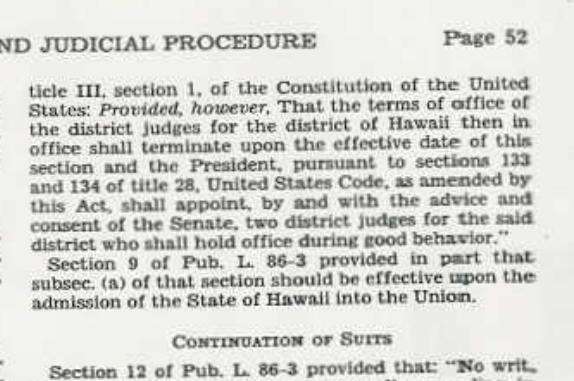Chapter 4:*
The Three United States
By 1945, the year of the first nuclear war on planet Earth, the U.S. Supreme Court had come to dispute Marshall's singular definition, but most people were too distracted to notice. The high Court confirmed that the term "United States" can and does mean three completely different things, depending on the context:
The term "United States" may be used in any one of several senses. [1] It may be merely the name of a sovereign* occupying the position analogous to that of other sovereigns in the family of nations. [2] It may designate the territory over which the sovereignty of the United States** extends, or [3] it may be the collective name of the states*** which are united by and under the Constitution.
[Hooven & Allison Co. v. Evatt, 324 U.S. 652 (1945)]
[brackets, numbers and emphasis added]
This same Court authority is cited by Black's Law Dictionary, Sixth Edition, in its definition of "United States":
United States. This term has several meanings. [1] It may be merely the name of a sovereign occupying the position analogous to that of other sovereigns in family of nations, [2] it may designate territory over which sovereignty of United States extends, or [3] it may be collective name of the states which are united by and under the Constitution. Hooven & Allison Co. v. Evatt, U.S. Ohio, 324 U.S. 652, 65 S.Ct. 870, 880, 89 L.Ed. 1252.
[brackets, numbers and emphasis added]
In the first sense, the term "United States*" can refer to the nation, or the American empire, as Justice Marshall called it. The "United States*" is one member of the United Nations. When you are traveling overseas, you would go to the U.S.* embassy for help with passports and the like. In this instance, you would come under the jurisdiction of the President, through his agents in the U.S.* State Department, where "U.S.*" refers to the sovereign nation. The Informer summarizes Citizenship in this "United States*" as follows:
1. I am a Citizen of the United States* like you are a Citizen of China. Here you have defined yourself as a National from a Nation with regard to another Nation. It is perfectly OK to call yourself a "Citizen of the United States*." This is what everybody thinks the tax statutes are inferring. But notice the capital "C" in Citizen and where it is placed. Please go back to basic English.
[Which One Are You?, page 11]
[emphasis added]
Secondly, the term "United States**" can also refer to "the federal zone", which is a separate nation-state over which the Congress has exclusive legislative jurisdiction. (See Appendix Y for a brief history describing how this second meaning evolved.) In this sense, the term "United States**" is a singular phrase. It would be proper, for example, to say, "The United States** is ..." or "Its jurisdiction is ..." and so on. The Informer describes citizenship in this United States** as follows:
2. I am a United States** citizen. Here you have defined yourself as a person residing in the District of Columbia, one of its Territories, or Federal enclaves (area within a Union State) or living abroad, which could be in one of the States of the Union or a foreign country. Therefore you are possessed by the entity United States** (Congress) because citizen is small case. Again go back to basic english [sic]. This is the "United States**" the tax statutes are referring to. Unless stated otherwise, such as 26 USC 6103(b)(5).
[Which One Are You?, page 11]
[emphasis added]
Thirdly, the term "United States***" can refer to the 50 sovereign States which are united by and under the Constitution for the United States of America. In this third sense, the term "United States***" does not include the federal zone, because the Congress does not have exclusive legislative authority over any of the 50 sovereign States of the Union. In this sense, the term "United States***" is a plural, collective term. It would be proper therefore to say, "These United States***" or "The United States*** are ..." and so on. The Informer completes the trio by describing Citizenship in these "United States***" as follows:
3. I am a Citizen of these United States***. Here you have defined yourself as a Citizen of all the 50 States united by and under the Constitution. You are not possessed by the Congress (United States**). In this way you have a national domicile, not a State or United States** domicile and are not subject to any instrumentality or subdivision of corporate governmental entities.
[Which One Are You?, pages 11-12]
[emphasis added]
Author and scholar Lori Jacques summarizes these three separate governmental jurisdictions in the same sequence, as follows:
It is noticeable that Possessions of the United States** and sovereign states of the United States*** of America are NOT joined under the title of "United States." The president represents the sovereign United States* in foreign affairs through treaties, Congress represents the sovereign United States** in Territories and Possessions with Rules and Regulations, and the state citizens are the sovereignty of the United States*** united by and under the Constitution .... After becoming familiar with these historical facts, it becomes clear that in the Internal Revenue Code, Section 7701(a)(9), the term "United States**" is defined in the second of these senses as stated by the Supreme Court: it designates the territory over which the sovereignty of the United States** extends.
[A Ticket to Liberty, Nov. 1990, pages 22-23]
[emphasis added, italics in original]
http://www.supremelaw.org/fedzone11/pdf/chapter4.pdf
You should explore this site at some point:
http://www.supremelaw.org/fedzone11/index.htm








 Reply With Quote
Reply With Quote